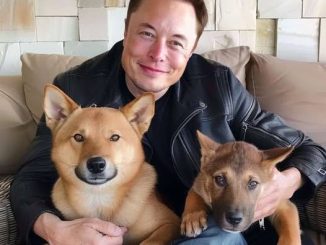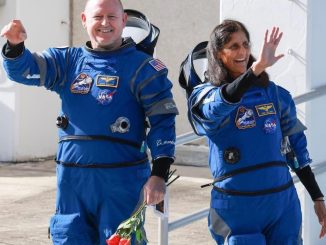Zoran Milanović’s strong showing in a general election could give him an opening to chart a trajectory that would hurt Ukraine and play into Russia’s hands.

Milanović’s transformation from a relatively conventional politician to a media spectacle included hurling coarse language at his political opponents. | Attila Kisbenedek/AFP via Getty Images
Croatia’s maverick president, Zoran Milanović, who gained international attention for his criticism of the EU and NATO, emerged as a significant force in the country’s general election on Wednesday and is now poised to play a key role in shaping the next government.
Milanović’s sudden surge in popularity, despite being a mainstay of Croatian politics for decades, was fueled by provocative remarks he has made, such as denouncing as fascist the Ukrainian wartime chant Slava Ukraini, or “Glory to Ukraine,” and rejecting the EU’s influence on Croatian politics.
According to preliminary results on Wednesday night, his party is well short of an outright majority but looks like it has scored well enough — in second place — to have a consequential voice in remolding Zagreb’s political direction.
“He was a left-liberal politician, while now he has edged closer to becoming a Balkan Trump character, to the point that he’s announced he would challenge the veracity of election results if his party doesn’t win the elections,” said Žarko Puhovski, a political analyst and public intellectual.
Milanović’s skepticism regarding the EU, U.S. and NATO is unusual for the Adriatic country, where unwavering support for Western alliances has been the norm across all parties. Over the past two years of war in Ukraine, Zagreb was also seen in Brussels as reliably mainstream in support for Kyiv, but that stance may now depend on how much influence Milanović and his party can command.
His rhetoric seems to have resonated with the public, who have shown record support for the Social Democratic Party (SDP), which for years failed to animate voters and was largely reduced to playing second fiddle to the center-right Croatian Democratic Union (HDZ).
Even the turnout reached historic highs, with more than 50 percent of the country’s over 3.7 million eligible voters casting ballots until 4.30 p.m.
According to preliminary results published by the central election commission with over 90 percent of votes counted, the HDZ secured 60 seats in the Croatian Sabor (parliament), while the SDP is projected to garner 42.
With neither securing an outright majority of 76 seats in the 151-strong parliament, the parties will have to enter coalitions with either right-wing or left-wing entities that passed the threshold.
The campaign unfolded after two years of intense verbal sparring between Milanović and Prime Minister Andrej Plenković of the HDZ. As the polls approached, the focus shifted away from political platforms and honed in on personal animosities.
Milanović’s transformation from a relatively conventional politician to a media spectacle included hurling coarse language at his political opponents, even calling Plenković a “fire-spewing badger” who is remote-controlled by Brussels.
Opinion polls have listed him as the most popular politician in a country desperate for distractions amid several years of crisis, including earthquakes, the economic fallout of the Ukraine invasion, and a pandemic-induced downturn that has proven particularly challenging for the tourism-reliant nation.
“These elections were marked by unprecedented divisions among the electorate, and there has never been less political content and more fighting between the main candidates in the elections,” Puhovski said.
Local media have likened the rapid surge in Milanović’s popularity and his possible return to the premiership to a “Slovak scenario,” drawing parallels to Robert Fico’s recent re-election in Bratislava. Both espouse pro-Russian stances and oppose the bloc’s unified policy on Ukraine. Milanović was prime minister from 2011 to 2016.
Plenković, by contrast, has been applauded for his ability to steer HDZ — a party that dominated the country’s politics for decades — away from its dominant nationalist and even far-right talking points to a more pro-EU and centrist approach, at least when it comes to key policy.
HDZ’s legacy is closely tied to Croatia’s war of independence during the Yugoslav disintegration of the 1990s. The party has faced criticism for its association with individuals accused of war crimes and for aligning with sympathizers with Croatia’s World War II-era Nazi puppet state.
“Usually, right-wing parties in Croatia would be deemed more hysterical around elections and the left-wing parties would be the rational ones. This time, their roles were switched,” Puhovski continued.
Voters may have leaned toward supporting the SDP due to accusations of widespread corruption within the HDZ government. With a staggering 30 ministers having resigned for corruption during their mandate, the electorate likely sought a clean break from the tainted legacy of the previous administration.
Milanović’s antics also led to a minor constitutional crisis that arose after elections were called in March when he declared his candidacy for prime minister under the SDP banner while refusing to step down as president.
The country’s highest court barred Milanović from running officially or being listed on the ballot if he declined to resign. However, he managed to serve as the SDP’s unofficial candidate, casting a shadow over the campaign.
“The fundamental principles of the constitution have been violated, wherein the head of state is strictly non-partisan,” explained Puhovski, underscoring that the president’s role is to uphold a balance between state institutions and not leverage his position to pursue the highest office in the country, as Milanović did.
Source: Politico


